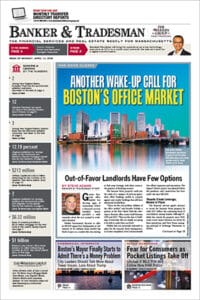
A “for lease” sign hangs above an empty storefront on Washington Street in downtown Boston. A recession next year or a weakening labor market could give office tenants an opening to demand workers return downtown full-time, some observers say. Photo by James Sanna | Banker & Tradesman Staff
Remember all the hype in the local and national media last September about the so-called “return to the office,” when half-empty towers in Boston would overnight be once again bustling with life?
As you may have noticed, it’s been an abysmal failure.
However, if you thought the boss would give up that easily, you were sorely mistaken.
Tech giants, financial services firms and other companies are gearing up for a big push next year to get employees back into the office, said Tyler McGrail, executive managing director at commercial brokerage Newmark’s Boston office.
Just call it Return to the Office 2.0.
And the future of downtown Boston – or at least in its current form – may hang in the balance.
“They want to get their remote workers back to the office,” McGrail said at the annual market overview put on by NAIOP Massachusetts. “Everyone would like to get people back.”
Everyone’s Hurting
The shift to remote work has been devastating for the vitality of the city’s commercial heart.
Just a third to half of all offices in downtown Boston are filled with actual workers on any given day, said McGrail.
The Financial District and Downtown Crossing are pockmarked with empty storefronts and spaces where restaurants once served hungry office workers.
“Obviously, people are not coming into the office,” McGrail said at the commercial real estate firm’s big event.
Tower and office building owners are also taking it on the chin as well.
On paper, at least, office rents are holding up, but a peek at some of the concessions landlords are having to offer in order to keep tenants is revealing.
Thanks to things like months of free rent and generous allowances for office fit-outs, the true cost of leasing space has dropped my as much as 20 percent.
There has also been an explosion in sublease space as companies try and off-load unneeded offices, with the amount having more than doubled to 8 million square feet.
And projects like the South Station and Winthrop Center towers are steadily moving towards completion. They’ll soon hit the market with more than 3 million in additional, brand-spanking-new high-rise space.
Oh yeah, and investors, having noticed all that empty office space, are no longer interested in shelling out a $1 billion or more on a mega-deal to buy one of the city’s top towers.
There have been no major office high-rise sales in Boston this year – zilch, nada, zero – sparking the term “tower failure” among brokers, McGrail said.
Suburbs Score Far Better
To be fair, investors are pretty much not buying anything but a few modest buildings in the suburbs right now. There, in contrast to downtown Boston, occupancy – the actual percentage of flesh and blood human beings showing up for work each day at an office – is in the 60 to 70 percent range, McGrail said.
On top of all that, the life sciences market, once so red-hot, is now cooling, meaning we will be seeing a slowdown in the number of deals where empty offices are converted into labs.
Whether downtown Boston continues to slide, or manages to bounce back from its biggest challenge in decades, now hinges on whether companies truly can herd their workers back to the office.

Scott Van Voorhis
But as we head into 2023, companies are likely to up the tempo on the back-to-the-office drumbeat, the Newmark executive said, providing a lifeline for this battered Boston neighborhood as city officials struggle to revive shuttered shops and restaurants.
For now, companies are trying to lure employees back with upscale office suites and other amenities, boosting demand for the newest and best space in downtown Boston amid an otherwise depressed market, McGrail said.
Companies are scared to push too hard and potentially lose talent in a tight labor market, he said.
However, if the economy, as expected, softens significantly or slides into a recession next year, here’s betting we will see an end to the wooing and soft-sell tactics by employers.
Rather, companies will stop pleading and start demanding employees come back to the office.
Scott Van Voorhis is Banker & Tradesman’s columnist; opinions expressed are his own. He may be reached at sbvanvoorhis@hotmail.com.





